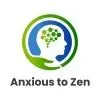What is ACT?
Mental Brakes to Prevent Mental Breaks
In the words of Dr Steven Hayes, often hailed as the father of Acceptance and Commitment Training (ACT), human beings have the biological equivalent of an advanced sport car between our ears. However, you would not let someone drive such a vehicle without telling them where the brakes are! Here at Anxious to Zen we not only tell them where the brakes are but how to use them.
ACT is one of the relatively ‘new wave’ of therapeutic interventions and lends itself towards group training as it is transdiagnostic and based on a set of principles.
In practical terms this means getting 30 people in a room and teaching them these principles regardless of how their personal issues manifest. This in turn makes it a cost effective solution for businesses looking to improve the wellbeing of their staff, reduce absenteeism, increase focus and improve staff retention.
At its heart is the cultivation of Psychological Flexibility otherwise known as Resilience. Learning how to define what is important and set that as your direction regardless of the narrative and emotions created by the mind.
ACT is based on a branch of science called Relational Frame Theory (RFT) and describes how, as humans, we learn in response to our environment and experiences to create ‘frames’ around certain contexts.
In a somewhat simplified manner, a frame consists of an experience (context), reflections and thoughts on the experience, emotions or feelings elicited by those reflections, and ultimately, actions or behaviours in reaction to the thoughts and emotions.


This can be very adaptive as we change in response to our environment to keep moving forward and growing as individuals. Through this mechanism we resolve issues, and it can be said that we have created a ‘positive’ adaptation.
Stress and Maladaptive Anxiety start in the same way but the ultimate actions and behaviours can be said to be dysfunctional. These behaviours may include procrastination in decision making, avoidance of people, places or things, use of distractions including drugs and alcohol, none of which are long-term ‘workable’ behaviours.
In our courses we explain how frames form and how our choices can either reinforce a frame or undermine a frame. We look to teach people how to reinforce adaptive frames and undermine maladaptive frames.
There are three core principles in ACT:
Openness
Awareness
Intention
The courses explain what these principles are and how to apply them in our daily lives.
Whilst the course is ACT based it also leverages elements of neuroscience to support the process.
ACT is ‘experiential’ – it needs to be lived. In the words of Russ Harris, the Psychotherapist instrumental in popularising ACT, we can use the tools in ACT to help people get out of their heads and back into their lives.
The course does not use complex jargon and is pitched at a level for anyone to understand.
With engagement in the process anyone, not just people who present as anxious, depressed or stressed, are likely to see benefits in their lives through this work.
Contact Us
Please fill out the Contact form if you would like further information on the services that we provide
